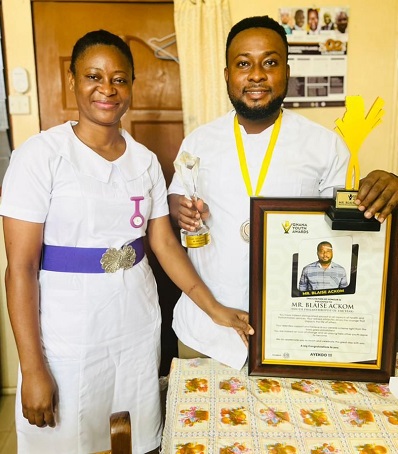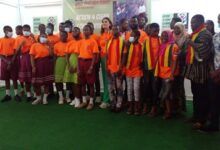
A Nurse at the Madina Polyclinic, Kekele, Blaise Ackom, has been adjudged the best Sustainable Development Goals (SDGs) 10 advocate of the year at this year’s Humanitarian Awards Global held on August 27.
Additionally, he has been named Youth Philanthropist of the year at the Ghana Youth Awards held by the Who Cares About Me Foundation.
The awards, according to the organisers, were in recognition of his outstanding services as a Cervical Cancer Advocate, Health influencer and a Medical Media Personality within the past five years.
At the event in Accra, he also received citations of honour from the Federation of Ghana Medical Laboratory Science Students’ Association as well as from the Women’s Commission Office of various universities in the country.
Among other things, the citations commended MrAckom for reaching out to many young girls and women in Ghana, especially in societies which are hard-to-reach in almost all the regions through the media, churches, schools and community groups to educate them on cervical cancer prevention.
He was also lauded for personally funding the screening of young girls and women who could not afford the screening services.
Dedicating the award to Ms Ida Osei-Kuffour, Deputy Chief Nursing Officer, Madina Polyclinic, Kekele, MrAckom said he was ready to do more to help individuals and communities towards the realisation of the SDGs.
In Ghana, an estimated 3,056 women are diagnosed with cervical cancer yearly of which more than 1,506 lose their lives.
Due to the global burden of cervical cancer, cervical cancer prevention has been a major health concern in his advocacy programmes for the past years.
It is a health crisis impacting women and their families across the world, especially in low-resource settings.
In 2020, an estimated 604,237 women were diagnosed with cervical cancer globally, representing 6.5 per cent of all female cancers.
Cervical cancer killed an estimated 341,843 women in 2020, 90 per cent of whom were in less developed regions of the world, where access to prevention, screening and treatment services are severely limited.
Today, more women are dying of cervical cancer than are dying in childbirth.
The odds of dying upon progressing to cervical cancer are almost similar to those upon contracting Ebola.
BY TIMES REPORTER







